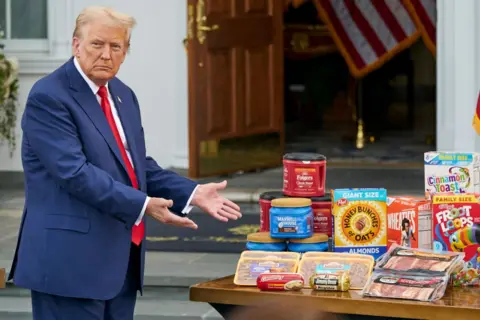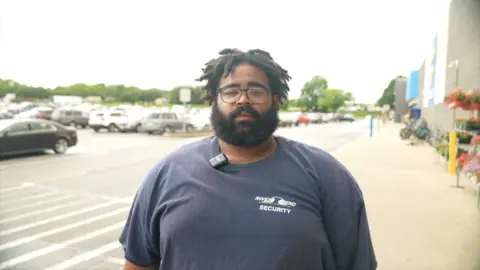'Our food doesn't even last the month' - Americans brace for Trump's welfare cuts
Elizabeth Butler goes from one supermarket to the next in her hometown of Martinsburg, West Virginia, to ensure she gets the best price on each item on her grocery list.
Along with 42 million Americans, she pays for those groceries with federal food subsides. That cash doesn't cover the whole bill for her family of three.
"Our food doesn't even last the month," she says. "I'm going to all these different places just to make sure that we have enough food to last us the whole month."
But that money may soon run out, as Congress gears up to vote on what US President Donald Trump has coined his "big beautiful bill".
The food subsidy programme that Ms Butler uses - called the Supplemental Nutrition Assistance Program, commonly known as SNAP - is one of many items on the chopping block, as Congress tries to reconcile the president's seemingly conflicting demands to both lower taxes and balance the budget.
The Senate is due to vote on their version of the bill by the end of the week. If it passes, it will then be voted on by the House, at which point it will be sent to Trump to sign. He has pressured both chambers of Congress, which the Republican Party controls, to pass the bill by 4 July.
The politics behind cutting SNAP
SNAP offers low-income households, including older Americans, families with children and people who are disabled, money each month to buy groceries. In West Virginia, one of the states with the highest rates of poverty, 16% of the population depends on the benefit.
The state is also a reliable Republican stronghold and voted overwhelmingly for Trump in November, when he ran on the promise of reducing the cost of living for Americans, including the price of groceries.
"When I win, I will immediately bring prices down, starting on Day One," he said at an August press conference surrounded by packaged foods, milk, meats and eggs.
 Getty Images
Getty ImagesMonths after the president made that pledge, the prices of commonly purchased groceries like orange juice, eggs and bacon are higher than they were the same time last year.
It's a fact that has not gone unnoticed by Ms Butler: "The president hasn't changed the food prices yet and he promised the people that he would do that."
Trump has argued, without providing an explanation how, that spending cuts in the 1,000-page budget bill will help bring food prices down: "The cut is going to give everyone much more food, because prices are coming way down, groceries are down," Trump said when asked specifically about cuts to SNAP.
"The One, Big, Beautiful Bill will ultimately strengthen SNAP through cost-sharing measures and common-sense work requirements," a White House official told the BBC.
Republicans have long been divided on how to fund social welfare programmes like SNAP and Medicaid. While many think the government should prioritise balancing the budget, others, especially in impoverished regions, support programmes that directly help their constituents.
As the bill stands, Senate Republicans are proposing $211bn (£154bn) in cuts with states being partly responsible for making up the difference.
In theory, passing the bill should be an easy political lift, since Republicans control both chambers of Congress and the White House.
But since the bill includes cuts to programmes like SNAP and Medicaid, which are popular with everyday Americans, selling the bill to all factions within the Republican Party has not been an easy feat.
Reports of private frustration and dissent about potential cuts to Medicaid and SNAP have leaked in recent weeks, showing the internal wrestling happening within the party.
West Virginia Senator Jim Justice told Politico in June that he has warned fellow Republicans that cutting SNAP could cost the party their majority in Congress when voters head to the polls again in 2026.
"If we don't watch out, people are going to get hurt, people are going to be upset. It's going to be the No.1 thing on the nightly news all over the place," Justice said. "And then, we could very well awaken to a situation in this country where the majority quickly becomes the minority."
A recent poll by the Associated Press/NORC Center for Public Affairs Research found that 45% of Americans think food assistance programmes like SNAP are underfunded, while only 30% think the funding levels are adequate. About a quarter of respondents found programmes were overfunded.
This is not the first time the party has wrestled with cuts to SNAP, said Tracy Roof, a University of Richmond professor who is currently writing a book on the political history of SNAP.
Under the Biden administration, Congress allowed expanded benefits implemented during Covid to be phased out, despite both Republicans and Democrats warning Americans could go hungry.
"One thing about [SNAP] is that it has bi-partisan support, more than any other anti-poverty programme," Prof Roof told the BBC.
But this time feels different, she said.
"One thing that kind of distinguishes this period from the previous efforts to cut social welfare programmes has been the willingness of congressional Republicans to vote for things many of them apparently off the record have many concerns about," she said. "Before, there were always moderate Republicans, particularly in the Senate, but in both Houses that held out for concessions."
She attributes that submission to two things: Fear of getting on the wrong side of Trump and a lack of fear of public backlash for representatives who hold congressional seats they can easily get re-elected to.
The BBC contacted Congressman Riley Moore, who represents Martinsburg, West Virginia, about the impacts of the cuts to his constituents, but he did not respond.
Moore voted for the initial House bill, which included the cuts to SNAP.
Missouri Senator Josh Hawley, who had been one of the more vocal critics of the cuts, has since softened: Hawley told the news outlet NOTUS he has "always supported" most of the Medicaid cuts and he would "be fine" with most of what's in the bill.

'The only thing that kept me and my family alive'
Father of two Jordan, who asked that his last name not be used, has spent the past three years surviving on SNAP benefits.
He and his wife get about $700 a month to feed their family of four, but they still struggle.
The 26-year-old says his wife has struggled to get work and take care of their two children simultaneously, so if changes to SNAP impact his family, he is prepared to act and get a second job.
"I'm going to make sure that I can do whatever I can to feed my family," he says.
He and other West Virginians are following what happens to the bill in Congress.
Cameron Whetzel, 25, grew up in a family dependent on SNAP. But when he and his wife tried to apply for SNAP, he learned that making $15 a hour was too much to qualify, he said.
"It's not great the fact that I need to double my salary in order to be able to afford groceries," Mr Whetzel said, adding "we have not bought any eggs in four months just cause they're too expensive".
He is frustrated that officials in Washington do not understand the impacts of the cuts they are backing in Congress, he said.
"To make a federal cut that then would be put onto the state that's already struggling it just kind of feels like kicking a horse while its down," Mr Whetzel says. "Whether you believe in small government or big government, government has to provide for somebody, somehow."
With additional reporting from Bernd Debusmann Jr
